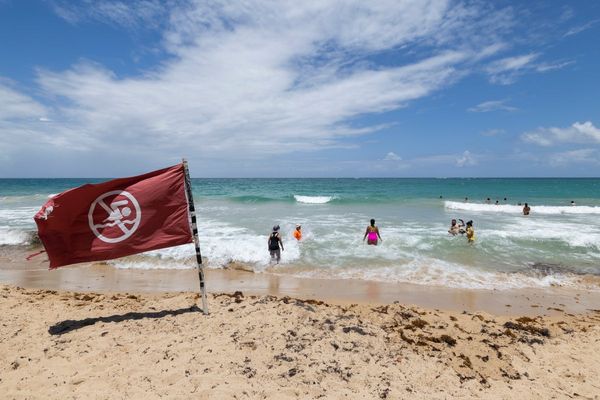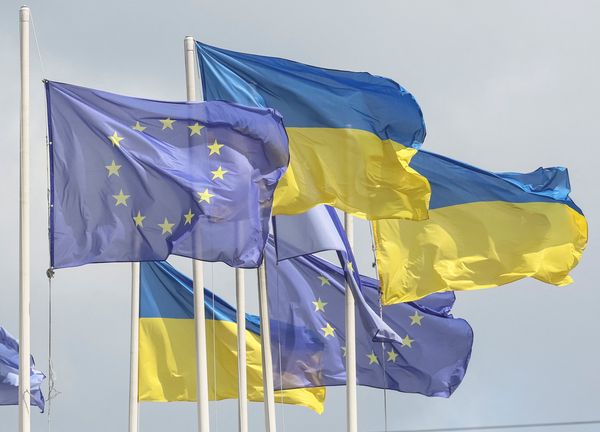KYIV, Ukraine — Ukrainian President Volodymyr Zelenskyy agreed to negotiations with Russia on Sunday “without preconditions” even as Moscow put its nuclear forces on high alert and Russian troops bore down on Kyiv and continued their thrust toward a number of cities across the country.
The Ukrainian government plans to dispatch a delegation to meet with its Russian counterparts “without preconditions” on the Ukrainian-Belarusian border, near the Pripyat River, according to a statement issued by Zelenskyy’s official channel on the Telegram messaging app.
Earlier in the day, an aide to Russian President Vladimir Putin and the head of the Russian delegation, Vladimir Medinsky, had set a 3 p.m. local time deadline for Ukraine to join negotiations, saying that rejecting the proposal would put “all responsibility for the bloodshed” on the Ukrainian side, according to a report from Russian state news outlet RIA. Confirmation of the Ukrainians’ participation was received moments before the deadline ran out, Medinsky later said.
“For our part, we guarantee 100% safety of the route, passage, and we will wait at this place for a delegation of the Ukrainian administration.”
It remains unclear who will head the Ukrainian delegation and where exactly it will meet. Zelenskyy’s statement said Belarus President Alexander Lukashenko would take responsibility “for ensuring that all planes, helicopters and missiles stationed on Belarusian territory remain on the ground during the Ukrainian delegation’s travel, talks and return.”
Zelenskyy had rejected an earlier call for negotiations in Belarus, saying that holding talks there — per Moscow’s demand — was untenable when Belarusian territory was being used as a staging ground for the Russian invasion. “Of course, we want peace, we want to meet, we want for the war to end,” Zelenskyy said earlier. “Warsaw, Bratislava, Budapest, Istanbul, Baku — we have suggested all that to Russia.”
Reports emerged later on Sunday that negotiations had yet to begin and may be delayed until Monday.
The news of negotiations came as Putin ordered the Russian army’s nuclear deterrence forces on combat alert. Putin said he was giving the order because “top officials in NATO’s leading countries have been making aggressive statements against our country,” according to a report from Russian state news operator Tass.
A senior U.S. defense official, responding to those reports on Sunday morning, said, “We have no reason to doubt the validity of this order. But how it manifested itself, I don’t think is completely clear yet.”
“We believe,” the official added, “that this is not only an unnecessary step for [Putin] to take, but an escalatory one — unnecessary because Russia has never been under threat by the West or by [the North Atlantic Treaty Organization], and certainly wasn’t under any threat by Ukraine, and escalatory because it’s clearly potentially putting at play forces that if there’s a miscalculation could make things much, much more dangerous.”
Still, word of pending negotiations gives a glimmer of hope of a cessation of hostilities even as the fighting — now in its fourth day — has brought fierce battles on the streets of Kharkiv, Ukraine’s second-largest city. There were also reports that Russian missiles struck a gas pipeline.
“The Russian enemy’s light vehicles have broken into Kharkiv, including the city centre,” regional governor Oleh Sinegubov said in a Facebook post. “Ukraine’s armed forces are destroying the enemy. We ask civilians not to go out to the streets.”
Kharkiv is about 24 miles from Ukraine’s northern frontier with Russia, making it an essential target for an incursion. But combat in tight urban settings — the city has a population of approximately 1.4 million — is likely to result in a high number of casualties.
On Saturday, an artillery round hit a nine-story residential building in the city. One person was killed and 80 were rescued. As of Saturday afternoon local time, there were 240 civilian casualties, including 64 dead, according to the U.N. Office for the Coordination of Humanitarian Affairs.
The violence has also forced an exodus of some 368,000 people to neighboring European countries, the United Nations’ refugee agency said Sunday, more than double the figure mentioned earlier in the weekend. Governments estimate the war could result in as many as 5 million refugees.
There was also damage to infrastructure. Outside Kyiv, Russian bombardment hit an oil depot in the town of Vasylkiv, some 20 miles to the southwest. Video posted by Ukraine’s State Service of Special Communications and Information Protection showed a ferocious blaze and a large plume of smoke rising into the night sky above the depot.
“The enemy wants to destroy everything,” Vasylkiv Mayor Natalia Balasinovich said in a Facebook post.
Maj. Gen. Igor Konashenkov, a Russian defense ministry spokesman, said Kherson and Berdyansk in Ukraine “were completely blocked” by Russian forces. The information could not be verified.
Kyiv residents woke up to a quiet, cold but sunny morning, with only a few cars and cyclists breaking a citywide curfew set to expire Monday morning. In the distance, the booms of explosions and the crackle of gunfire pierced the silence.
Beyond Ukraine, international opprobrium against Russia’s campaign — which Moscow insists on calling a “special military operation” but has been widely condemned as an unprovoked invasion — is growing.
On Sunday, the European Union banned all Russian-owned, Russian-registered or Russian-controlled aircraft from its airspace, said European Commission head Ursula von der Leyen in a televised address. Previously, many individual governments had announced such prohibitions. The move means that planes cannot land, take off or even fly over European nations, forcing them to take different routes to reach their destinations.
Von der Leyen also struck out at Russia Today and Sputnik, two state-sponsored outlets that broadcast in Europe as well as on social media channels such as YouTube.
“We are developing tools to ban that toxic and harmful disinformation in Europe,” von der Leyen said.
Even the International Judo Federation has taken a stand, suspending Putin’s status as honorary president and ambassador for the group “in light of the ongoing war conflict in Ukraine.” That has followed other steps that have effectively sidelined Russia as a sporting destination and competitor, including the cancellation of the Formula 1 Grand Prix slated to be held in the city of Sochi in September, and Poland, Sweden and the Czech Republic refusing to play Russia in soccer World Cup playoffs.
On Saturday, the Biden administration joined a raft of European allies in agreeing to disconnect a number of Russian banks from SWIFT, the messaging system used by financial institutions for facilitating transactions worldwide. In a statement provided by Russian state news Tass, the Russian central bank said it “has the necessary resources and tools to maintain financial stability and ensure the operational continuity of the financial sector.”
“All customer funds on the accounts are saved and available at any time. Banking services are provided as usual. Bank cards of all banks in Russia also continue to work normally.”
The EU has also broken its taboo on providing arms in a conflict, the bloc’s foreign policy chief, Josep Borrell, said in a televised address on Sunday.
Konashenkov, the Russian defense ministry spokesman, acknowledged for the first time Sunday that there were dead and wounded among Russian servicemen.
He added during a press briefing that since the start of the operation, 1,067 military infrastructure facilities in Ukraine had been struck and that the Russian army had recorded and identified Ukrainian leaders involved in the “abuse of our comrades.”
“All of you will be found and will inevitably bear severe responsibility,” he said.
The pending negotiations may offer an offramp for a Russian president facing an increasingly punitive resistance against him, internationally but also in Ukraine. Russian forces, though they have yet to deploy en masse in cities, have faced stiff resistance from Ukrainian troops and from residents armed with rifles and homemade bombs who are furious that a people they once considered brothers are now invaders.
However, the tone of Konashenkov’s remarks implied that, should negotiations fail, Putin may be prepared to inflict a higher death toll.
As well, Ramzan Kadyrov, a top Putin ally who heads Russia’s Chechnya region, said Sunday that Russian forces had so far been “coddling” their Ukrainian adversaries, who “are armed to the teeth with new weapons, ammunition [and] heavy equipment of the latest generation.”
“The time has come to make a concrete decision and start a large-scale operation in all directions and on the territory of Ukraine,” he said.
“In my understanding, the chosen tactics in Ukraine are too slow. It takes a long time and, in my opinion, is not effective.”
———
(Los Angeles Times staff writer Sarah D. Wire in Washington contributed to this report.)







